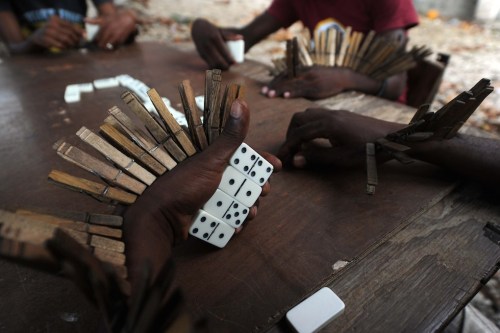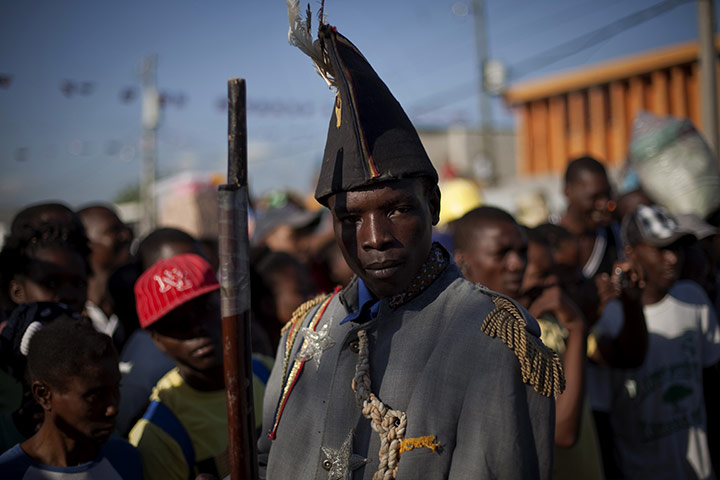Jean Jacques Dessalines was born in a sugarcane plantation in the Grande Riviere du Nord from enslaved African parents whose country of birth place are still unknown. The only early family members he had that history has kept, was his aunt whom he affectionately called Mantou and, two brothers: Louis and Joseph Duclos who would later adopt the last name Dessalines, after
Haiti's Independence. Jean Jacques Dessalines, just like the rest of children born from two enslaved parents at the time, was also a slave. He worked under the extremely harsh conditions of a white French man named Henry Duclos, until he was sold to a freed slave who treated him much better. About 30 years old, Dessalines escaped and joined the slave revolution that was sparked by
Bookman, after the
Bois Caiman Ceremonyin 1791. He joined François Papillon and Georges Biassou in the mountains who were already training a few escaped slaves. Under their mentorships Dessalines learned the art of fighting; although illiterate, Dessalines was an amazingly quick leaner, he would later become a greater soldier than
Toussaint L'Ouverture in terms of fighting abilities. Dessalines, under the command of his aforementioned mentors, traveled to Santo Domingo, the western part of
Hispaniola, then occupied by Spain, to fight alongside the Spaniards against the French in Saint Domingue, the eastern part of the Island. There, he would meet the incredible Toussaint L'Ouverture. Jean Jacques Dessalines fighting skills propelled him to the rank of Lieutenant and when Toussaint L'Ouverture got promoted as Commander of the Spanish Army, he chose Dessalines as his chief Lieutenant.
Jean Jacques Dessalines was an intrepid soldier, a formidable general, great strategist, master tactician, ruthless leader and unforgiving commander. Dessalines quickly gained great reputation for the many successful engagements he commanded, but he acquired most of his reputation for the
"Take no prisoners policy"he came up with. This policy consisted of burning entire villages to the ground and cutting the head of all the whites. To make sure that all French were killed, he ordered the summary execution of all Europeans, the only exceptions were women, children, priests, teachers and doctors.
" Haiti must be cleansed of every French taint"he said. Dessalines was one, if not, the most ferocious leader in Haiti's history, he was cruel to the extreme; he had a sanguine heart and spirit. Nearly all historians have labeled him as a blood thirsty monster who delighted in the sufferings of Europeans. In a bloody battle near Cap-Français, (now
Cap Haitien), Rochambeau, a French General, took 500 hundred blacks and executed them all the same day, each with a gunshot in the head; Dessalines hearing of this, captured one thousand white French soldiers, brought them to within the sight of the French and hung them all up. Pamphile de la Croix, in a letter sent to France, said:
"Dessalines is one of the most ferocious human beings ever born..."Dessalines made his victims endured the most excruciating tortures and the most horrible deaths. He used to bury his victims alive, impaling them upright on bayonets; his own specialty which came to be known simply as
Baionettes; cutting and shooting the more fortunate. While there is absolutely no deny of the ferocity of Dessalines, a ferocity which even Toussaint L'Ouverture didn't really like. He even once said to Dessalines:
" I said to prune the tree, not to uproot it." Toussaint, although ordered the killings, wanted to keep his hand, reputation and conscious clean. But to understand Dessalines, one must take 2 things into account:
1) Dessalines was the kind of soldier necessitated in the battlefields at the time, a general willing to see plainly what was needed and not hesitating to respond bluntly.
2) The conditions that surrounded him as a child. If Dessalines became cruel, it was because of the treatments he and other slaves received from the French masters. It is noted that when Dessalines escaped to join the slaves in the mountains, he was disfigured from lashes, all his body were covered with deep scars left by beatings. Plus the french were as cruel as Dessalines. French masters used to dump cane syrup on slaves, buried them but leaving their head out so they can breath and remain alive, while ants eat them to death; throwing disobedient slaves in boiling cauldrons of cane syrup was common practice among other
despicable treatments. One can only imagine what effects these conditions had on the slave Jean Jacques Dessalines.
Dessalines and Toussaint are the most revered Haitian heroes, while Toussaint was a diplomat; military expediency distinguished Dessalines.
After the capture and deportation of Toussaint L'Ouverture by the French General Leclerc on May 5th, 1802; Dessalines assumed the post of Commander in Chief of the Haitian Army. The shift of powers was immediately felt by both the French and the Haitian soldiers. He deemed that the war was now a revolution for total independence rather than colonial autonomy with emancipation, like Toussaint wanted.
No more diplomacy.
"Liberty or death; to renounce forever to France, and to die rather than to live under its domination."






 The downside of not knowing how to cook haitian food and being away from home leaves me craving for that shyt.
The downside of not knowing how to cook haitian food and being away from home leaves me craving for that shyt.
 I forgot you was haitian.
I forgot you was haitian.